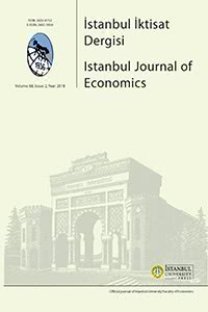GENETİK ALGORİTMA İLE EĞİTİLMİŞ DESTEK VEKTÖR REGRESYON KULLANILARAK TÜRKİYE’NİN ELEKTRİK TÜKETİM TAHMİNİ
Enerji, gelişmekte olan ve endüstrileşen ülkeler için ekonomik kalkın- manın sürdürülebilmesi açısından çok önemli bir faktördür. Elektrik ener- jisi de endüstrileşme ve yaşam standardının yükseltilmesi için en önemli enerji formlarından biridir. Enerji bakımından dışa bağımlı bir ülke olan Türkiye’de elektrik tüketiminin modellenmesi ve tahmin edilmesi ayrı bir öneme sahiptir. Bu çalışmada destek vektör regresyon yöntemiyle Türki- ye’nin 1975-2014 yılları arası elektrik tüketimi, nüfusu, ithalat, ihracat ve GSYH verileri kullanılarak bir tahmin uygulaması yapılmıştır. DVR para- metrelerinin seçiminde genetik algoritma yardımıyla yöntem performansı önemli ölçüde arttırılmıştır.
Anahtar Kelimeler:
Elektrik tüketimi, Destek vektör regresyon, Ge- netik algoritma, Tahmin
FORECASTING OF TURKEY’S ELECTRICITY CONSUMPTION USING SUPPORT VECTOR REGRESSION TRAINED WITH GENETIC ALGORITHM
Energy is a very important factor in terms of sustaining the economic development for developing and industrialized countries. Electricity is one of the most important forms of energy for industrialization and improvement of living standards. The estimation and modeling of electricity consumption has a special importance in Turkey which is a foreign-dependent country in energy. In this study a forecasting application is made by using Turkey’s electricity consumption, population, import, export and gross domestic product between 1975-2014, employing support vector regression method. By using genetic algorithm to choose the parameters of SVR, the method outperforms significantly.
___
- Abosedra, S., Dah, A., ve Ghosh, S. (2009) “Electricity consumption and economic growth, the case of Lebanon” Applied Energy, 86(4):429-432.
- Akay, D., ve Atak, M. (2007) “Grey prediction with rolling mechanism for electricity demand forecasting of Turkey” Energy, 32(9):1670-1675.
- Altinay, G., ve Karagol, E. (2005) “Electricity consumption and economic growth: evidence from Turkey” Energy Economics, 27(6):849-856.
- Azadeh, A., ve Tarverdian, S. (2007) “Integration of genetic algorithm, computer simulation and design of experiments for forecasting electrical energy consumption” Energy Policy, 35(10):5229-5241.
- Azadeh, A., Ghaderi, S. F., Tarverdian, S., ve Saberi, M. (2007) “Integration of artificial neural networks and genetic algorithm to predict electrical energy consumption” Applied Mathematics and Computation, 186(2):1731-1741.
- Azadeh, A., Ghaderi, S. F., ve Sohrabkhani, S. (2008) “A simulated-based neural network algorithm for forecasting electrical energy consumption in Iran” Energy Policy, 36(7):2637-2644.
- Bianco, V., Manca, O., ve Nardini, S. (2009) “Electricity consumption forecasting in Italy using linear regression models” Energy, 34(9):1413- 1421.
- Chen, S. T., Kuo, H. I., ve Chen, C. C. (2007) “The relationship between GDP and electricity consumption in 10 Asian countries” Energy Policy, 35(4):2611-2621.
- Ekonomou, L. (2010) “Greek long-term energy consumption prediction using artificial neural networks” Energy, 35(2):512-517.
- Fan, S., Chen, L., ve Lee, W. J. (2008) “Machine learning based switching model for electricity load forecasting” Energy Conversion and Management, 49(6):1331-1344.
- Gürbüz, F., Öztürk, C., ve Pardalos, P. (2013) “Prediction of electricity energy consumption of Turkey via artificial bee colony: a case study” Energy Systems, 4(3):289-300.
- Hamzaçebi, C. (2007) “Forecasting of Turkey’s net electricity energy consumption on sectoral bases” Energy Policy, 35(3):2009-2016.
- Holland, J.H. (1975) Adaption in Natural and Artificial Systems, University of Michigan Pres, Ann Arbor, MI, 1975.
- Hong, W. C. (2009a) “Electric load forecasting by support vector model” Applied Mathematical Modelling, 33(5):2444-2454.
- Hong, W. C. (2009b) “Chaotic particle swarm optimization algorithm in a support vector regression electric load forecasting model” Energy Conversion and Management, 50(1):105-117.
- Hong, W. C. (2010) “Application of chaotic ant swarm optimization in electric load forecasting” Energy Policy, 38(10):5830-5839.
- Hu, Z., Bao, Y., ve Xiong, T. (2013) “Electricity load forecasting using support vector regression with memetic algorithms” The Scientific World Journal.
- Kavaklioglu, K., Ceylan, H., Ozturk, H. K., ve Canyurt, O. E. (2009) “Modeling and prediction of Turkey’s electricity consumption using artificial neural networks” Energy Conversion and Management, 50(11):2719-2727.
- Kavaklioglu, K. (2011) “Modeling and prediction of Turkey’s electricity consumption using Support Vector Regression” Applied Energy, 88(1):368-375.
- Kavaklioglu, K. (2014) “Robust electricity consumption modeling of Turkey using singular value decomposition” International Journal of Electrical Power & Energy Systems, 54:268-276.
- Kucukali, S., ve Baris, K. (2010) “Turkey’s short-term gross annual electricity demand forecast by fuzzy logic approach” Energy Policy, 38(5):2438-2445.
- Narayan, P. K., ve Smyth, R. (2009) “Multivariate Granger causality between electricity consumption, exports and GDP: evidence from a panel of Middle Eastern countries” Energy Policy, 37(1):229-236.
- Oğcu, G., Demirel, O. F., ve Zaim, S. (2012) “Forecasting electricity consumption with neural networks and support vector regression” Procedia-Social and Behavioral Sciences, 58:1576-1585.
- Pao, H. T. (2009) “Forecast of electricity consumption and economic growth in Taiwan by state space modeling” Energy, 34(11):1779-1791.
- Sözen, A., ve Arcakioglu, E. (2007) “Prediction of net energy consumption based on economic indicators (GNP and GDP) in Turkey” Energy policy, 35(10):4981-4992.
- Toksarı, M. D. (2007) “Ant colony optimization approach to estimate energy demand of Turkey” Energy Policy, 35(8):3984-3990.
- Tso, G. K., ve Yau, K. K. (2007) “Predicting electricity energy consumption: A comparison of regression analysis, decision tree and neural networks” Energy, 32(9):1761-1768.
- Türedi S., Berber M. (2007) “Enerji Tüketimi ve Ekonomik Büyüme İlişkisi Uzun Dönem Analizi: Türkiye Örneği (1976-2005)”, İkinci Uluslararası İşletme ve Ekonomi Çalıştayı, Giresun, Türkiye.
- Vapnik, V. (1995) The Nature of Statistic Learning Theory, Springer– Verlag, New York, 1995.
- Wang, J., Zhu, W., Zhang, W., ve Sun, D. (2009) “A trend fixed on firstly and seasonal adjustment model combined with the ε-SVR for short- term forecasting of electricity demand” Energy Policy, 37(11):4901- 4909.
- Yang, H. Y. (2000) “A note on the causal relationship between energy and GDP in Taiwan” Energy economics, 22(3):309-317.
- Yoo, S. H. (2006) “The causal relationship between electricity consumption and economic growth in the ASEAN countries” Energy policy, 34(18):3573-3582.
- ISSN: 2602-4152
- Yayın Aralığı: Yılda 2 Sayı
- Başlangıç: 1939
- Yayıncı: İstanbul Üniversitesi
